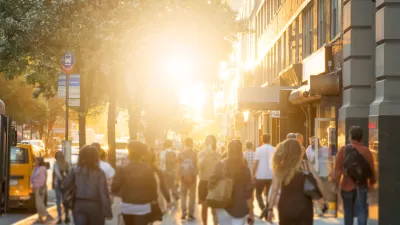Regular Planetizen contributors Nikos Salingaros and Michael Mehaffy get deep into the importance of network connectivity in cities and the reasons why sprawl is incredibly ineffective.
Writing in Metropolis, Salingaros and Mehaffy explain there theory that "[a] city comes alive only when it is a network that connects many different types of urban activities and nodes.":
"This means that the traditional, mixed-use city is alive, precisely because of its inclusivity of distinct functions, different scales, and different dynamics - which holds as long as one of them doesn't destroy the others. Every diverse place and function should catalyze other essential urban functions, and this is what keeps the network connected and keeps its flows going."
Sprawl, on the other hand, "because of its stretched and fragmented network geometry, requires enormous expenditures of energy: it is, in fact, the most energivorous urban invention in history."
FULL STORY: Frontiers of Design Science: The Network City

Planetizen Federal Action Tracker
A weekly monitor of how Trump’s orders and actions are impacting planners and planning in America.

San Francisco's School District Spent $105M To Build Affordable Housing for Teachers — And That's Just the Beginning
SFUSD joins a growing list of school districts using their land holdings to address housing affordability challenges faced by their own employees.

The Tiny, Adorable $7,000 Car Turning Japan Onto EVs
The single seat Mibot charges from a regular plug as quickly as an iPad, and is about half the price of an average EV.

Seattle's Plan for Adopting Driverless Cars
Equity, safety, accessibility and affordability are front of mind as the city prepares for robotaxis and other autonomous vehicles.

As Trump Phases Out FEMA, Is It Time to Flee the Floodplains?
With less federal funding available for disaster relief efforts, the need to relocate at-risk communities is more urgent than ever.

With Protected Lanes, 460% More People Commute by Bike
For those needing more ammo, more data proving what we already knew is here.
Urban Design for Planners 1: Software Tools
This six-course series explores essential urban design concepts using open source software and equips planners with the tools they need to participate fully in the urban design process.
Planning for Universal Design
Learn the tools for implementing Universal Design in planning regulations.
Smith Gee Studio
City of Charlotte
City of Camden Redevelopment Agency
City of Astoria
Transportation Research & Education Center (TREC) at Portland State University
US High Speed Rail Association
City of Camden Redevelopment Agency
Municipality of Princeton (NJ)




























